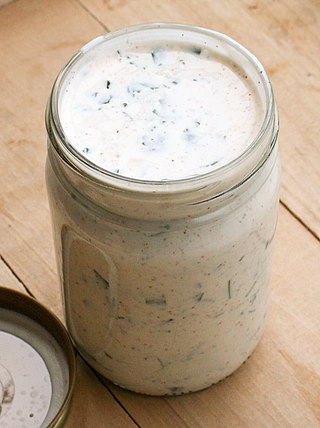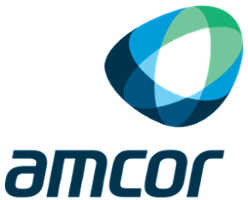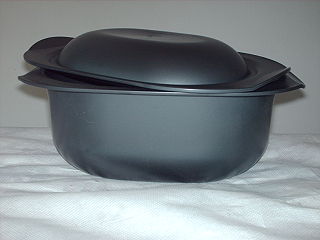
A supermarket is a self-service shop offering a wide variety of food, beverages and household products, organized into sections. This kind of store is larger and has a wider selection than earlier grocery stores, but is smaller and more limited in the range of merchandise than a hypermarket or big-box market. In everyday U.S. usage, however, "grocery store" is often used to mean "supermarket".
Food energy is chemical energy that animals derive from their food to sustain their metabolism, including their muscular activity.
Maxim or Maksim may refer to:

Ranch dressing is a savory, creamy American salad dressing usually made from buttermilk, salt, garlic, onion, mustard, herbs, and spices mixed into a sauce based on mayonnaise or another oil emulsion. Sour cream and yogurt are sometimes used in addition to, or as a substitute for, buttermilk and mayonnaise.

A steel can, tin can, tin, steel packaging, or can is a container for the distribution or storage of goods, made of thin metal. Many cans require opening by cutting the "end" open; others have removable covers. They can store a broad variety of contents: food, beverages, oil, chemicals, etc. Steel cans are made of tinplate or of tin-free steel. In some dialects, even aluminium cans are called "tin cans".

Packaging is the science, art and technology of enclosing or protecting products for distribution, storage, sale, and use. Packaging also refers to the process of designing, evaluating, and producing packages. Packaging can be described as a coordinated system of preparing goods for transport, warehousing, logistics, sale, and end use. Packaging contains, protects, preserves, transports, informs, and sells. In many countries it is fully integrated into government, business, institutional, industrial, and personal use.

Shelf life is the length of time that a commodity may be stored without becoming unfit for use, consumption, or sale. In other words, it might refer to whether a commodity should no longer be on a pantry shelf, or no longer on a supermarket shelf. It applies to cosmetics, foods and beverages, medical devices, medicines, explosives, pharmaceutical drugs, chemicals, tyres, batteries, and many other perishable items. In some regions, an advisory best before, mandatory use by or freshness date is required on packaged perishable foods. The concept of expiration date is related but legally distinct in some jurisdictions.

A carton is a box or container usually made of liquid packaging board, paperboard and sometimes of corrugated fiberboard. Many types of cartons are used in packaging. Sometimes a carton is also called a box.

Amcor plc is a global packaging company. It develops and produces flexible packaging, rigid containers, specialty cartons, closures and services for food, beverage, pharmaceutical, medical-device, home and personal-care, and other products.

A label is a piece of paper, plastic film, cloth, metal, or other material affixed to a container or product, on which is written or printed information or symbols about the product or item. Information printed directly on a container or article can also be considered labelling.

The nutrition facts label is a label required on most packaged food in many countries, showing what nutrients and other ingredients are in the food. Labels are usually based on official nutritional rating systems. Most countries also release overall nutrition guides for general educational purposes. In some cases, the guides are based on different dietary targets for various nutrients than the labels on specific foods.

Heinz Tomato Ketchup is a brand of ketchup manufactured by the H. J. Heinz Company, a division of the Kraft Heinz Company.
Fuji Food Products is a food manufacturer based in Santa Fe Springs, California, United States, that specializes in ready-to-eat sushi products for supermarkets in the United States. The company is owned by Meruelo Group which purchased it in 2009.

An expiration date or expiry date is a previously determined date after which something should no longer be used, either by operation of law or by exceeding the anticipated shelf life for perishable goods. Expiration dates are applied to selected food products and to some other manufactured products like infant car seats where the age of the product may impact its safe use.

The term cosmetic packaging is used for cosmetic containers and secondary packaging of fragrances and cosmetic products. Cosmetic products are substances intended for human cleansing, beautifying and promoting an enhanced appearance without altering the body's structure or functions.

Plastic containers are containers made exclusively or partially of plastic. Plastic containers are ubiquitous either as single-use or reuseable/durable plastic cups, plastic bottles, plastic bags, foam food containers, Tupperware, plastic tubes, clamshells, cosmetic containers, up to intermediate bulk containers and various types of containers made of corrugated plastic. The entire packaging industry heavily depends on plastic containers or containers with some plastic content, besides paperboard and other materials. Food storage nowadays relies mainly on plastic food storage containers.
Monogram Foods is a privately held, Memphis, Tennessee-based, manufacturer and marketer of packaged and value-added foods. The company, which distributes its products nationwide, operates manufacturing and distribution facilities in Indiana, Iowa, Massachusetts, Minnesota, Tennessee, Virginia, and Wisconsin. Monogram Foods manufactures a number of items, including beef jerky, corn dogs, frozen appetizers, assembled sandwiches, and baked goods.











